On April 30, 1942: “my father and his family lost their freedom upon entry to Tanforan Racetrack, a designated Assembly Center in San Bruno, California, for the wartime removal of Japanese. Arriving by bus, [ . . . ] they were housed in a series of empty horse stalls named Barrack 14. This was just the first stop; from Tanforan they would be transported by train into the Utah desert to live in a concentration camp named Topaz.”
NewPages Blog
At the NewPages Blog readers and writers can catch up with their favorite literary and alternative magazines, independent and university presses, creative writing programs, and writing and literary events. Find new books, new issue announcements, contest winners, and so much more!
Letters to Memory
Spread the word!
Everything We Don’t Know
Aaron Gilbreath’s book of essays, Everything We Don’t Know, posed a dilemma as I was trying to determine the audience for it. Taking the title at face value, I expected to find fresh ideas about people, places, and, of course, things. His first few essays appear as a memoirish charting of his drug addiction. Not really on my list of wanting-to-know-abouts. But before long, Gilbreath turns his focus to other subjects and fulfills my expectations.
Spread the word!
The Great American Songbook
The nine stories in Sam Allingham’s The Great American Songbook include: an experimental modular tale describing the differences between the composers Rogers and Hart; the retelling of a quirky and complicated relationship between two baristas seeking love and finding confusion; a second-person epistle emoting on a relationship’s ending; a tragedy in which a newly widowed mother turns to hunting; an exploratory list of the characters we encounter in life; a hard-boiled parable (a lá George Saunders) about four assassins set against each other; a straight-forward first-person recounting of a childhood neighborhood friend who devoted his life to building the town in miniature; a bar joke that goes virtual and a talking duck becomes protagonist; and concludes with the lost letters of Artie Shaw to various friends before going off the deep end in a remote cabin. The Great American Songbook is a tour de force of style, theme, image, and wit.
Spread the word!
In Which I Play the Runaway
Selected by Richard Blanco as the 2015 winner of The Barrow Street Press Poetry Prize, Rochelle Hurt’s In Which I Play the Runaway is a tightly-structured map of the human heart. Spanning the ventricles of mythical America, each section is named after a town: Last Chance, California; Hurt, Virginia; Needmore, Indiana; Accident, Maryland; and Honesty, Ohio—the author names the inner-workings of daughter, mother, wife, and poet. Almost all the sections conclude with a prose poem and contain self-portraits and dioramas. Dorothy from The Wizard of Oz provides a dramatic-persona through-line, much in the vein of Berryman’s alter-ego Huffy Henry, creating a close to perfectly-structured second collection.
Spread the word!
Let It Die Hungry
I have never seen anything like Caits Meissner’s first solo collection: Let it Die Hungry. Brave. Eclectic. Essential. Especially in this day and age when the rats in power are filling the swamp with evil droppings. Let It Die Hungry is a manifesto, a manual, a survivor’s message-in-a-bottle and a battle-cry.
Spread the word!
The Ladder
“Teach me to climb / Down from ambition. // Beyond my fingertips / rolls the moon.” –from the title poem, “The Ladder”
Spread the word!
Big Muddy 2016 Flash & Short Story Contest Winners
 The most recent issue (17.1) of Big Muddy: A Journal of the Mississippi River Valley features winners of two of the publication’s annual contests:
The most recent issue (17.1) of Big Muddy: A Journal of the Mississippi River Valley features winners of two of the publication’s annual contests:
2016 Mighty River Short Story Contest
$1000 Award and Publication
“In the Jungle” by Jeremy Griffin [pictured]
2016 Wilda Hearne Flash Fiction Contest
$500 Award and Publication
“Frayed Cords and Pink Underwear” by Shannon Sweetnam
Spread the word!
Horse-Riding Librarians First Bookmobile
 From the Smithsonian article “Horse-Riding Librarians Were the Great Depression’s Bookmobiles” by Eliza McGraw:
From the Smithsonian article “Horse-Riding Librarians Were the Great Depression’s Bookmobiles” by Eliza McGraw:
During the Great Depression, a New Deal program brought books to Kentuckians living in remote areas.
In 1936, packhorse librarians served 50,000 families, and, by 1937, 155 public schools. Children loved the program; many mountain schools didn’t have libraries, and since they were so far from public libraries, most students had never checked out a book. “‘Bring me a book to read,’ is the cry of every child as he runs to meet the librarian with whom he has become acquainted,” wrote one Pack Horse Library supervisor. “Not a certain book, but any kind of book. The child has read none of them.”
Read the full article and see more photos here.
Spread the word!
The Cincinnati Review 2017 Schiff Award Winners
 The Summer 2017 issue of The Cincinnati Review features the winning entries of their annual Robert and Adele Schiff Awards in poetry in prose:
The Summer 2017 issue of The Cincinnati Review features the winning entries of their annual Robert and Adele Schiff Awards in poetry in prose:
Prose Winner
“Stylites Anonymous” by Maureen McGranaghan
Poetry Winner
“Very Many Hands” by Aaron Coleman [pictured]
Each winner receives $1000 in addition to publication.
Spread the word!
American Life in Poetry :: Cathryn Essinger
American Life in Poetry: Column 639
BY TED KOOSER, U.S. POET LAUREATE
One of my favorite poems is Louise Bogan’s “The Crossed Apple” which mentions two species, Meadow Milk and Sweet Burning, and since reading it many years ago I have made notes of the names of apples, a poet’s delight. In this touching poem by Cathryn Essinger, who lives in Ohio, I’ve come upon yet another for my collection. Her most recent book is What I Know About Innocence from Main Street Rag press.
Summer Apples
 I planted an apple tree in memory
I planted an apple tree in memory
of my mother, who is not gone,
but whose memory has become
so transparent that she remembers
slicing apples with her grandmother
(yellow apples; blue bowl) better than
the fruit that I hand her today. Still,
she polishes the surface with her thumb,
holds it to the light and says with no
hesitation, Oh, Yellow Transparent . . .
they’re so fragile, you can almost see
to the core. She no longer remembers how
to roll the crust, sweeten the sauce, but
her desire is clear—it is pie that she wants.
And so, I slice as close as I dare to the core—
to that little cathedral to memory—where
the seeds remember everything they need
to know to become yellow and transparent.
We do not accept unsolicited submissions. American Life in Poetry is made possible by The Poetry Foundation (www.poetryfoundation.org), publisher of Poetry magazine. It is also supported by the Department of English at the University of Nebraska-Lincoln. Poem copyright ©2016 by Cathryn Essinger, “Summer Apples,” from Alaska Quarterly Review, (Vol 33, No. 1 & 2, 2016). Poem reprinted by permission of Cathryn Essinger and the publisher. Introduction copyright ©2017 by The Poetry Foundation. The introduction’s author, Ted Kooser, served as United States Poet Laureate Consultant in Poetry to the Library of Congress from 2004-2006.
Spread the word!
The Southampton Review 10th Anniversary
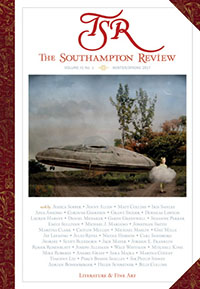 The Southampton Review Editor Lou Ann Walker recounts the day, ten years ago, when Robert Reeves, who would be rebuilding the MFA Creative Writing Program at Stony Brook University, opined that a “distinguished MFA program” should likewise have a “distinguished literary journal as its intellectual and creative center.” Then he asked Lou Ann: “Do you happen to know anyone who might be interested in founding and editing a literary review?” She writes that it had been her “secret dream” to do just that. Ten years later, Walker has created exactly the publication worthy of the university’s writing program – and vice versa! Publishing two issues per year, readers can also find selections available to read on the TSR website.
The Southampton Review Editor Lou Ann Walker recounts the day, ten years ago, when Robert Reeves, who would be rebuilding the MFA Creative Writing Program at Stony Brook University, opined that a “distinguished MFA program” should likewise have a “distinguished literary journal as its intellectual and creative center.” Then he asked Lou Ann: “Do you happen to know anyone who might be interested in founding and editing a literary review?” She writes that it had been her “secret dream” to do just that. Ten years later, Walker has created exactly the publication worthy of the university’s writing program – and vice versa! Publishing two issues per year, readers can also find selections available to read on the TSR website.
Spread the word!
Hanging Loose Young Writers
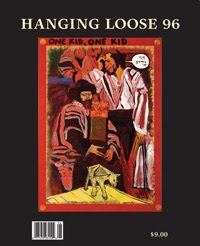 Hanging Loose, published by Hanging Loose Press since 1966, includes the section “Writers of High School Age” in each issue. Featured in issue 108 are two young poets who contribute several works each.
Hanging Loose, published by Hanging Loose Press since 1966, includes the section “Writers of High School Age” in each issue. Featured in issue 108 are two young poets who contribute several works each.
Elizabeth Girdharry writes of math and sciences with “Filling Empty Spaces,” including the lines “Mathematical formulas, / on how to stay tangent to the line, / somehow slipped my mind,” and “There Was Geometry” begins: “There is geometry in my junk drawer.” And comes back around to, “More importantly, / there is geometry in my junk drawer. / Angles and tangents twist out of circles / the same way you smooth back flyaway wisps of baby hair / when you’re pondering a hard science theory.”
Elise Wing crafts strong imagery to draw her readers in. “The Microscope” begins “Dead diatom / Crisp as a leaf skeleton,” and “The Living That Terrifies” begins with the amusing but poignant, “Your ears are the trees for egrets to nest in,” and “Tomorrow, the Seagulls” starts, “The future is as frightening as a three-headed hyena.”
NewPages includes Hanging Loose in our Young Writers Guide where we list publications written by and for young writers and readers as well as a vetted, ad-free list of contests for young writers.
Spread the word!
The Louisville Review Celebrates 40
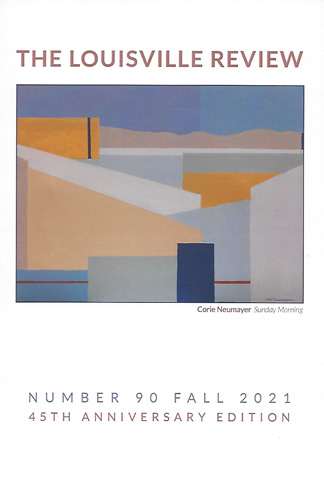 In celebration of TLR’s 40 years of publication and “looking toward the future,” Sena Jeter Naslund writes in the Editor’s Note, four guest editors all under the age of forty were invited to select works for this first issue year 41. “Each of them is a graduate, in various areas of concentration, of the Spalding University low-residency MFA in Writing Program,” notes Naslund. Making the selections: Eva Sage Gordon, nonfiction editor; Ellyn Lichvar, poetry and Children’s Corner editor; Amina S. McIntyre, drama editor; Flora K. Schildknecht, fiction editor.
In celebration of TLR’s 40 years of publication and “looking toward the future,” Sena Jeter Naslund writes in the Editor’s Note, four guest editors all under the age of forty were invited to select works for this first issue year 41. “Each of them is a graduate, in various areas of concentration, of the Spalding University low-residency MFA in Writing Program,” notes Naslund. Making the selections: Eva Sage Gordon, nonfiction editor; Ellyn Lichvar, poetry and Children’s Corner editor; Amina S. McIntyre, drama editor; Flora K. Schildknecht, fiction editor.
Spread the word!
Lit Mag Covers :: Picks of the Week
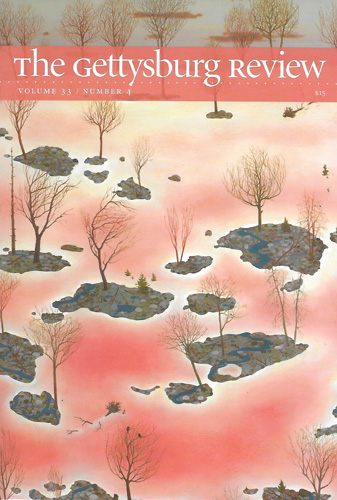 The Summer 2017 issue of The Gettysburg Review features paintings by Tina Newberry. In addition to this untitled cover piece, there are eight works in a full-color portfolio inside. It’s also worth a visit to her website to view her Barbies series.
The Summer 2017 issue of The Gettysburg Review features paintings by Tina Newberry. In addition to this untitled cover piece, there are eight works in a full-color portfolio inside. It’s also worth a visit to her website to view her Barbies series. You have to take a close look at this detail from “Iron Horse” by Kent Monkman on the cover of Brick #99 to get the full effect of the kind of cultural/historical mishmash that makes up this image and a great many of his works.
You have to take a close look at this detail from “Iron Horse” by Kent Monkman on the cover of Brick #99 to get the full effect of the kind of cultural/historical mishmash that makes up this image and a great many of his works.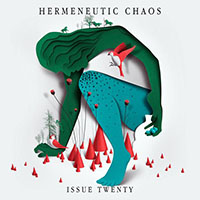 “Myth” by Eiko Ojala is a papercut illustration for the cover of the May 2017 issue of Hermeneutic Chaos Journal, an online bi-monthly publishing poetry and prose.
“Myth” by Eiko Ojala is a papercut illustration for the cover of the May 2017 issue of Hermeneutic Chaos Journal, an online bi-monthly publishing poetry and prose.
Spread the word!
Glimmer Train March/April Very Short Fiction Award Winners
Glimmer Train has chosen the winning stories for their March/April Very Short Fiction Award. This competition is held twice a year and is open to all writers for stories with a word count under 3000. The next Very Short Fiction competition will open on July 1. Glimmer Train’s monthly submission calendar may be viewed here.
 1st place goes to George Makana Clark [pictured] of Milwaukee, WI, who wins $2000 for “Pluto.” His story will be published in Issue 102 of Glimmer Train Stories.
1st place goes to George Makana Clark [pictured] of Milwaukee, WI, who wins $2000 for “Pluto.” His story will be published in Issue 102 of Glimmer Train Stories.
2nd place goes to Madiha Sattar of Karachi, Pakistan, for “Mulberry Street.” Her story will also be published in an upcoming issue of Glimmer Train, increasing her prize from $500 to $700.
3rd place goes to Oguz Dinc of Istanbul, Turkey, for “The Hurricane.” His story will also be published in an upcoming issue of Glimmer Train, increasing his prize from $300 to $700.
A PDF of the Top 25 winners can be found here.
Deadline soon approaching! Short Story Award for New Writers: June 30
This competition is held quarterly and is open to all writers whose fiction has not appeared in a print publication with a circulation over 5000. No theme restrictions. Most submissions to this category run 1500-5000 words, but can go up to 12,000. First place prize wins $2500 and publication in Glimmer Train Stories. Second/third: $500/$300 and consideration for publication. Click here for complete guidelines.
Spread the word!
Poem :: Self-Portrait as Girl Being Led On
Poet Clare Paniccia surprises readers by following up this title with the imagery of boys dissecting frogs in biology class, then skillfully guides this action to align with that of a girl’s realization about the nature of [those] boys who would treat girls similarly. Never in my life would I have put these two together, but Paniccia’s ability to do so seamlessly engages the reader in a strange tangle of reminicent emotion. Take the opportunity to hear her, and others on TriQuarterly‘s online journal, read the work herself.
Self-Portrait as Girl Being Led On
By Clare Paniccia
I watched them do it,
their small, fat fingers taking
to the swell of chest a blunt scalpel
and peeling, no, sawing into stomach
their fitful curiosity, the frog’s
glass eye staring outward and empty,
staring toward the very mouths of schoolboys
who entered so brutally the crevice, the abdomen’s
silenced bell. . . .
Read the rest and hear the poem read by the author on TriQuarterly.
Spread the word!
Rattle :: Tribute to Poets Living with Mental Illness
 The summer 2017 issue of Rattle features a tribute to poets living with mental illness. “An estimated 26% of Americans experience mental illness in a given year,” write the editors, “and we wanted to acknowledge and explore that reality, while also helping to diminish the associated cultural stigma of these illnesses. [. . . ] While the topics of the poems themselves vary greatly, each of the poets live with some form of depressive, anxiety, obsessive-compulsive, bi-polar, post-traumatic stress, or eating disorder—all of discussed openly and bravely in their contributor notes. In the conversation section, we talk about mental illness and a wide range of other topics with Francesca Bell.” [Cover Art by Jasmine C. Bell.]
The summer 2017 issue of Rattle features a tribute to poets living with mental illness. “An estimated 26% of Americans experience mental illness in a given year,” write the editors, “and we wanted to acknowledge and explore that reality, while also helping to diminish the associated cultural stigma of these illnesses. [. . . ] While the topics of the poems themselves vary greatly, each of the poets live with some form of depressive, anxiety, obsessive-compulsive, bi-polar, post-traumatic stress, or eating disorder—all of discussed openly and bravely in their contributor notes. In the conversation section, we talk about mental illness and a wide range of other topics with Francesca Bell.” [Cover Art by Jasmine C. Bell.]
Spread the word!
Translation Review :: Russian-to-English
In his introduction to Issue 97 of Translation Review, Boris Dralyuk, literary translator and the Executive Editor of the Los Angeles Review of Books, writes: “Today’s Russian-to-English translation community is far broader and more diverse; the body of work of any given translator might be smaller than that of Garnett, but there are so many more gifted translators that the shared corpus is a monumental achievement. In this, our era of translation does indeed resemble the Silver Age of Russian poetry…” Dralyuk goes on to discuss many contemporary writers, some of whose works fill the pages of this issue, “The Silver Age of Russian-to-English Transaltion,” while also recognizes the shoulders of the Golden Age writers upon which we now stand.
Translation Review is a forum for the discussion of the art, practice and theory of literary translation published by UT Dallas Center for Translation Studies and available online via Routledge Taylor & Francis Online. The full issue can be accessed here for individuals/institutions with logins. Without a login, the full preface can be accessed as well as beginning excerpts from each work published.
Spread the word!
Breathe Free Press :: Assistant Wanted
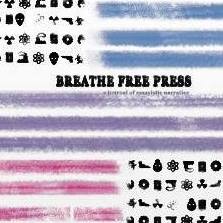 New online literary magazine Breathe Free Press specializes in the lyric essay. Having recently published their first issue, Editor Deborah Di Bari seeks an editorial assistant.
New online literary magazine Breathe Free Press specializes in the lyric essay. Having recently published their first issue, Editor Deborah Di Bari seeks an editorial assistant.
From Di Bari:
“We are seeking a freelance assistant for outreach to the literary community, strategize, manage and curate media content for social media and blog.”
Those interested in the position can contact Di Bari, using the Breathe Free Press email address.
Spread the word!
Word Fountain – Spring/Summer 2017
With so much to do in a day and so much to read in a lifetime, I always appreciate a little magazine that I can read in one sitting or fit into the straining seams of my bag. Word Fountain fulfilled my little lit mag needs, the Spring/Summer 2017 Issue a 50-page companion I carried with me for the past week. Produced by the Osterhout Free Library in Wilkes-Barre, PA, each issue makes sure to feature a portion of regional writers, seven of whom are in this edition.
Spread the word!
Animal – June 2017
At the beginning of each month, Animal: A Beast of a Literary Magazine brings readers one piece each in the categories of fiction, nonfiction, and poetry, all with an animal theme. With only three pieces per issue, readers can fully enjoy each piece at their own pace, strengthening their appreciation for animal inspiration.
Spread the word!
Alaska Quarterly Review – Winter/Spring 2017
Regular readers of the Alaska Quarterly Review should already know that this journal rarely disappoints. This issue of the review meets the highest of expectations as it has set the bar in so many issues at an altitude that allows the inclusion of veteran writers as well as those writers only just setting out on their professional journeys. This issue contains works that may set the standards for contemporary literature even higher still.
Continue reading “Alaska Quarterly Review – Winter/Spring 2017”
Spread the word!
Raleigh Review – Spring 2017
The Spring 2017 issue of the Raleigh Review provides its own summary in the editorial preface: it “captures the harmful attempts of the erasure of lineage, erasures of peoples, of civilizations, of families, of languages, of dialects as it relates the self to history and to place.” The poetry, the fiction, and the art direct us to a thoughtful reflection on our times and to an enriching artistic experience.
Spread the word!
CutBank – Spring 2017
If you appreciate finely-crafted stories that draw you into their worlds so that you become unaware of yourself as a physical being, then you will want to read this issue of CutBank. The poetry, nonfiction, and fiction pieces blend language and form in such ways that permit them to exist somewhere in a writerless universe where they come into being, yet seeming to have always been there. The writing is done with such skill and attention that makes it possible for readers to be unaware of the writing in a metaphysical sense. For me, this is the best type of writing: work that does not draw attention to itself as writing but rises above its own existence to breathe the air of higher altitudes; readers enter this oxygenated space for the duration.
Spread the word!
Ecotone – Fall/Winter 2016
As a person who has left the hustle of city life to seek out the quieter world of a rural town myself, I loved every page of Ecotone’s Country and City Issue. Each piece highlights the beauty of country life or the flurried activity of city life, celebrating how we live in both worlds.
Spread the word!
Imagine Our World Without Artists
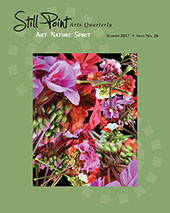 Artists say things with objects, images, symbols, and metaphors that are difficult, if not impossible, to express any other way.
Artists say things with objects, images, symbols, and metaphors that are difficult, if not impossible, to express any other way.
Artists have tremendous courage, a necessary quality when it comes to expressing personal dreams and emotions so all can see them.
Artists break down barriers of thought, time, custom, and expectation.
Artists make the intangible tangible.
Artists see the trees and the forest.
Artists challenge us to see and understand our world differently than we do now.
Artists are born with open hands and open hearts, courageously willing to accept whatever is given.
Imagine our world without artists, without their ability to see, dream, express, break down barriers, and challenge the rest of us to imagine our world differently.
Excerpted from Christine Brooks Cote, “Imagine Our World Without Artists,” from Still Point Arts Quarterly, Summer 2017.
Spread the word!
Fiddlehead 26th Annual Literary Contest Winners
The Fiddlehead No. 271 (Spring 2017) includes winners and honorable mentions from their 26th Annual Literary Contest:
 The Ralph Gustafson Prize for Best Poem
The Ralph Gustafson Prize for Best Poem
Dominique Bernier-Cormier’s “Fabric”
[author pictured]
Read an interview Bernier-Cormier here.
Poetry Honorable Mentions
Tammy Armstrong’s “Blessing the Boats”
Kim Trainor’s “Bluegrass”
Short Fiction Prize
Kate Finegan’s “Blues Too Bright”
Read an interview with Finegan here.
Fiction Honorable Mentions
Steven Benstead’s “Will There Be Clowns?”
Ann Cavlovic’s “The Foundation”
Winning entries can be read on The Fiddlehead‘s website.
Spread the word!
In Memorium :: Okla Elliot
 MAYDAY Magazine offers their spring 2017 issue (#11) in tribute to magazine cofounder, editor, writer, and teacher Okla Elliott, who passed away unexpectedly in his sleep March 19, 2017. Editors David Bowen and Raul Clement write in “A History of Friendships,” the Editors’ Introduction, “After the grief and shock—which of course still haven’t gone away and never will—and after all the immediate practical concerns, one thing became clear: Okla’s publishing ventures, including MAYDAY Magazine, should forge on. At MAYDAY, we were finalizing our spring issue. Okla Elliott was born on May 1st—Mayday, in fact—and the month of May was fast approaching. What better way to celebrate his life than a tribute issue in the birth month of his 40th year?”
MAYDAY Magazine offers their spring 2017 issue (#11) in tribute to magazine cofounder, editor, writer, and teacher Okla Elliott, who passed away unexpectedly in his sleep March 19, 2017. Editors David Bowen and Raul Clement write in “A History of Friendships,” the Editors’ Introduction, “After the grief and shock—which of course still haven’t gone away and never will—and after all the immediate practical concerns, one thing became clear: Okla’s publishing ventures, including MAYDAY Magazine, should forge on. At MAYDAY, we were finalizing our spring issue. Okla Elliott was born on May 1st—Mayday, in fact—and the month of May was fast approaching. What better way to celebrate his life than a tribute issue in the birth month of his 40th year?”
The editors reached out to friends and colleagues of Elliot for their remembrances. Twenty-two poets, fiction writers, and academics in various fields responded and their works are collected in this issue. Also featured are several interviews both with (previously published elsewhere) and by Elliott.
MAYDAY Magazine is published by New American Press and its full contents can be read online here.
Spread the word!
Gwendolyn Brooks at 100
 The June 2017 issue of Poetry features photographs and artifacts from the Poetry Foundation’s forthcoming exhibit, Matter in the Margins: Gwendolyn Brooks at 100, curated by Anna Chen, June 16–August 25, 2017.
The June 2017 issue of Poetry features photographs and artifacts from the Poetry Foundation’s forthcoming exhibit, Matter in the Margins: Gwendolyn Brooks at 100, curated by Anna Chen, June 16–August 25, 2017.
Chen writes: “Gwendolyn Brooks’s literary archives, now in the Rare Book & Manuscript Library at the University of Illinois at Urbana-Champaign, reveal that she clustered and bundled papers as well as life experiences: she tucked notes inside pieces of paper folded into makeshift pockets, slid photographs behind other photographs in albums, and pasted clippings on top of each other in scrapbooks. She added further layers of meaning with her copious annotations, like the detailed notes she wrote on the backs of many of her photographs (given in quotation marks in the accompanying images) in order to preserve the knowledge of the people and events they captured.”
Read Chen’s full introduction to this feature as well as view a slideshow of the photographs and artifacts here.
Spread the word!
Prarie Schooner’s Fusion :: Uganda
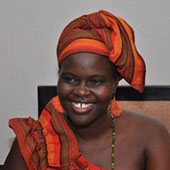 Fusion is Prarie Schooner’s online series, which Editor Kwame Dawes says, “is an opportunity to create dialog across geographical spaces and cultures through the sharing of art and writing. It represents an effort to create bridges between the many silos that separate us, and to do so by asking writers to think about the very things that connect us and distinguish us in different parts of the world.” Issue #11 is a collaboration with Ugandan poetry and art on the theme “Shoes.”
Fusion is Prarie Schooner’s online series, which Editor Kwame Dawes says, “is an opportunity to create dialog across geographical spaces and cultures through the sharing of art and writing. It represents an effort to create bridges between the many silos that separate us, and to do so by asking writers to think about the very things that connect us and distinguish us in different parts of the world.” Issue #11 is a collaboration with Ugandan poetry and art on the theme “Shoes.”
In her essay, “Ngato! Ngato! Shoes!” Ugandan Poet Beverley Nambozo Nsengiyunva [pictured] writes, “It’s often the most silent shoes that are the strongest. It’s the shoes that allow thieves to stalk upon unsuspecting people and the shoes that enable a cheetah to pounce on its prey. The silent shoes do not desire unnecessary attention to detract them from their mission.”
Read the full issue here.
Spread the word!
2017 Lamar York Prize Winners
Winners of the 2017 Lamar York Prize for nonfiction and fiction appear in the Spring 2017 issue of The Chattahoochee Review:
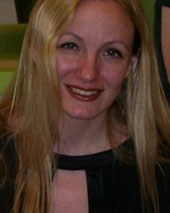 Winner in Fiction
Winner in Fiction
Selected by Patrick Ryan
“Papijack” by Carol LaHines [pictured]
Winner in Nonfiction
Selected by Jill Talbot
“First Visit” by Vince Granata
A full list of the finalists can be read here.
Spread the word!
Back to Basics :: Lee Gutkind
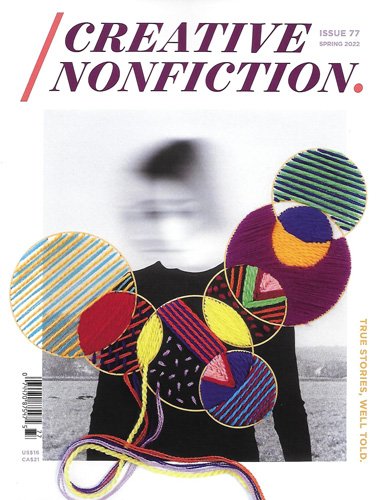 In his introduction to Issue 63 (Spring 2017) of Creative Nonfiction, themed “How We Teach,” Lee Gutkind writes about attending a yoga and creative writing retreat where he is teaching creative nonfiction to an “ecclectic” group of attendees. Just as varied is the group’s experience with yoga, which the yoga instructor misjudged by giving too rigorous of a few first sessions. Gutkind writes that the instructor backed down after that, teaching technique and form basics, regardless of the participant’s experience level. “We hard-core students thought we knew all of this stuff—some of us have been practicing for decades—so we were somewhat apprehensive at first. But as the lesson progressed, we began to realize that going back to the basics and relearning what we thought we knew was quite helpful.”
In his introduction to Issue 63 (Spring 2017) of Creative Nonfiction, themed “How We Teach,” Lee Gutkind writes about attending a yoga and creative writing retreat where he is teaching creative nonfiction to an “ecclectic” group of attendees. Just as varied is the group’s experience with yoga, which the yoga instructor misjudged by giving too rigorous of a few first sessions. Gutkind writes that the instructor backed down after that, teaching technique and form basics, regardless of the participant’s experience level. “We hard-core students thought we knew all of this stuff—some of us have been practicing for decades—so we were somewhat apprehensive at first. But as the lesson progressed, we began to realize that going back to the basics and relearning what we thought we knew was quite helpful.”
Gutkind likens this to our need to review our own practice, weed out bad habits we may have developed over the years, and get back in tune with the basics: “In yoga or writing—or in practicing any art or skill—it does not hurt to start over once in a while just to make sure you know what you think you know. In fact, it occurs to me this is also why teaching can be reinvigorating—I know many writers who make their primary living by teaching and who often find their inspiration in writing prompts given to their students. But maybe there’s also something about focusing on the basics that can inspire innovation and transformation.”
Read the full editorial here.
Spread the word!
The Fiddlehead :: Norman Dubie
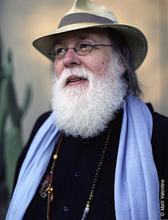 The Spring 2017 issue of The Fiddlehead: Atlantic Canada’s International Literary Journal includes a special feature on 2016 Griffin Prize international winner Norman Dubie. Editor Ross Leckie introduces the section of twenty-three poems, including five new ones, with “Norman Dubie: The Details of Winter That Upset Us.”
The Spring 2017 issue of The Fiddlehead: Atlantic Canada’s International Literary Journal includes a special feature on 2016 Griffin Prize international winner Norman Dubie. Editor Ross Leckie introduces the section of twenty-three poems, including five new ones, with “Norman Dubie: The Details of Winter That Upset Us.”
Leckie writes, “No poet I can think of writes as much about dreams as Dubie, and no poet ought to be able to, as dreams are so often adduced as the moment of epiphany, as the encoded truth that underlies all the banality that consumes our daily lives. In Dubie’s work, however, dreams seem as one room in the mind’s library, in which there is also an astonishing array of books and the lives of their authors, and details of plot and character that are not there, but could be. There are landscapes both from memory and from imagination, scenes of history in the grotesquerie of its filth and muck, and assorted friends and family who demand attention, or simply stop by for a chat.”
Spread the word!
Lit Mag Covers :: Picks of the Week
 Love this summery landscape photo by David FitzSimmons on the Spring 2017 cover of River Teeth: A Journal of Nonfiction Narrative.
Love this summery landscape photo by David FitzSimmons on the Spring 2017 cover of River Teeth: A Journal of Nonfiction Narrative. A look back to fall, this macro focus on the cover of Cimarron Review #198 is “Ornamental” by Kathleen Galvin. This beautiful image decieves the trecherous nature of these “Sweet Gum Balls” that blanket the ground beneath their trees in the fall.
A look back to fall, this macro focus on the cover of Cimarron Review #198 is “Ornamental” by Kathleen Galvin. This beautiful image decieves the trecherous nature of these “Sweet Gum Balls” that blanket the ground beneath their trees in the fall.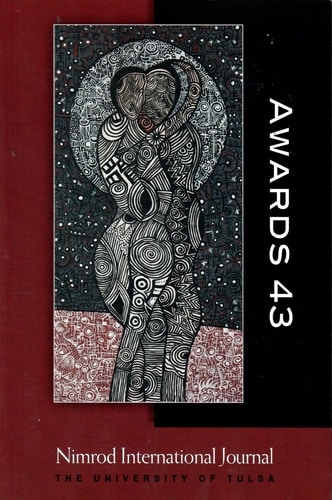 “Leaving Home Finding Home” is the Spring/Summer 2017 theme of Nimrod International Journal published out of The University of Tulsa. The photograph is “After Loss, The Photographer Collects Small Homes in the Hope of Finding Love” by Ashley Inguanta.
“Leaving Home Finding Home” is the Spring/Summer 2017 theme of Nimrod International Journal published out of The University of Tulsa. The photograph is “After Loss, The Photographer Collects Small Homes in the Hope of Finding Love” by Ashley Inguanta.
Spread the word!
All the Difference
Imagine being a 13-year-old in the hands of a “large, stubble-faced man who was smoking a cigar. [ . . . ] a man who would spread his tobacco-stained fingers on my torso, breathe his sour breath into my face.” Sounds like a child about to undergo a nasty ordeal. Though it’s not what you may be thinking, Patricia Horvath did, in fact, experience this ordeal after being diagnosed with scoliosis, “a double, S-shaped curvature of the spine.”
Spread the word!
Behind the Mask
Two years ago, Meerkat Press founder Tricia Reeks listened as co-editor Kyle Richardson talked enthusiastically about comic book superheroes. That led to issuing a call for submissions. Seven hundred stories poured in, 20 of which are published in the delightfully entertaining book, Behind the Mask.
Spread the word!
Crude
Taylor Brorby is outspoken when it comes to the devastation of land in the Great Plains. To voice the issues he is most concerned about, he wrote a book of poetry called Crude. Brorby is a fellow at the Black Earth Institute, which defines itself as a “progressive think-tank dedicated to re-forging the links between art and spirit, earth and society.” He also educates people around the country by speaking about fracking.
Spread the word!
Threnody
“Toward a flower- / ing I came // lowly lupine raised / wrist,” Juliet Patterson begins in “Toward,” the opening poem of her latest collection, Threnody, out last fall from Nightboat Books. And with these few lines, she deftly establishes the themes and sensibilities of her project: nature raised up into inspection, and with it, inspection itself (the wrist). Quiet, patient, yet often with a swarming force, these poems worry the fraught intersection between humanity and nature, where, as we quickly see, threat abides. If nature is a flowering, it is a flowering against the edges of nothingness.
Spread the word!
This Sweet Haphazard
In the poem “16 Reasons You Shouldn’t Like Me (And I Don’t Like Me Either),” Gillian Wegener writes: “I mine the cupboards of memory / And all I come up with is / A treasury of embarrassments.” But there is nothing embarrassing about this new full-length collection of poems, This Sweet Haphazard.
Spread the word!
House Built on Ashes
There is no doubt that House Built on Ashes by José Antonio Rodríguez is an important story. It focuses on the youngest child of Mexican immigrants, who cross the border frequently to visit family in Mexico but then return to their impoverished life in Texas, where a young Rodríguez confronts issues of poverty, of family uncertainty, bullying at school, and also Rodríguez’s own developing sexuality. The book is organized in vignettes, not a single plot arc, but rather a painting of a life told through one- or two-page essays and narratives, sometimes even bordering on prose poems.
Spread the word!
Self-Portrait as Hildegard of Bingen
Poet Kate Fadick (who uses the pronouns “they, them, their”) has written a compact and thematically focused chapbook of poems inspired by the life of the German Benedictine abbess Hildegard of Bingen. Hildegard died in 1179 but remains remarkable for her ecological/cosmological mysticism as well as her achievements in music, theology, languages, playwriting, natural science and botany. Fadick, who only began writing poetry in their late 60’s, is the author of a previous chapbook of poems, Slipstream, published by Finishing Line Press in March, 2013.
Spread the word!
The Trembling Answers
“I was made // to be good like this, a father / before I was done being my father’s / son.” -from “Tracheotomy”
While most of the nation is wrangling over politics, some poets, like Craig Morgan Teicher, are reminding us of our human fragility in this pandemonium of voices. Poets like Teicher are forced by circumstance to cultivate a stillness of spirit for fear of inhaling or exhaling too carelessly and thereby breaking the already frayed cord of life struggling to hold itself together—that frayed cord being the speaker’s son so consciously observed in this 88-page manuscript of poems, The Trembling Answers.
Spread the word!
Some Bore Gifts
Some Bore Gifts is a fantastical take on the inner workings on the average person’s conscious mind. It is clear A.G. Harmon is precise and specific when it comes to each and every detail that he either includes or omits. The precise attention to detail and the playfulness applied to the everyday character in these stories will enchant and affect each and every person that flips through its pages.
Spread the word!
Communion
TJ Beitelman’s Communion is unlike any collection before it. The stories are written in pairs that, like the body and blood of actual Communion, are strikingly different in form, but very similar in underlying meaning. Beitelman’s stylistic approach showcases his mastery of multiple genres. Some of the stories resemble flash fiction or prose, while others resemble free-standing short stories or chapters in a book. One thing is for sure, Communion will trouble its readers in the most memorable of ways.
Spread the word!
Changes at Shanti Arts
 Today, Shanti Arts announced changes coming to Still Point Arts Quarterly.
Today, Shanti Arts announced changes coming to Still Point Arts Quarterly.
-
Art submissions in response to calls will be free. Everything else about the exhibitions stays the same: 30 artists will be featured online and in Still Point Arts Quarterly with five winners awarded. “The Art of Structure” is the current, open call.
-
The journal is transitioning from a print quarterly, to an interactive digital magazine. Paid subscriptions to the print journal will be honored until they expire.
-
Because of these changes, subscriptions and single copies of the digital magazine will be free for readers. Subscription sign-ups for the digital magazine are now being taken at the magazine’s website.
Check out what else founder and editor Christine Cote has to say about the changes at the Shanti Arts blog.
Spread the word!
Lit Mag Covers :: Picks of the Week
 This cover photo “Fête de la Rose” by Rebekah West introduces readers to Cargo, an online nonfiction journal featuring work with strong narrative and interior journey, such as immersion reportage, memoir, and personal essay as well as photography and visual art.
This cover photo “Fête de la Rose” by Rebekah West introduces readers to Cargo, an online nonfiction journal featuring work with strong narrative and interior journey, such as immersion reportage, memoir, and personal essay as well as photography and visual art.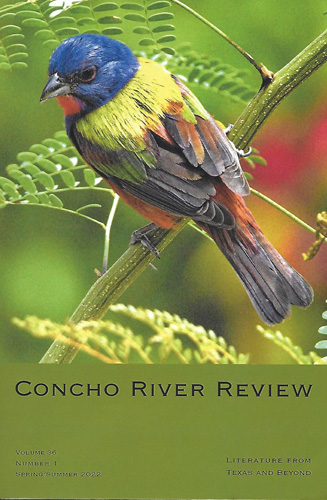 Tim L. Vasquez of Ziva-Gato Impressions contributed this gorgeous photo for the cover of Concho Review Review: Literature from Texas and Beyond, Spring/Summer 2017.
Tim L. Vasquez of Ziva-Gato Impressions contributed this gorgeous photo for the cover of Concho Review Review: Literature from Texas and Beyond, Spring/Summer 2017. Recognizing “the exciting literary, artistic, and scholarly work that is currently produced along the Wasatch and beyond” is the focus of the Spring/Summer 2017 issue of Weber: The Contemporary West. Pam Bowman’s “Becoming” is constructed of cotton rope and string, vinyl, steel, wood, paint, caulking cotton, and shown as installed in a 25′ x 35′ gallery space, 2013.
Recognizing “the exciting literary, artistic, and scholarly work that is currently produced along the Wasatch and beyond” is the focus of the Spring/Summer 2017 issue of Weber: The Contemporary West. Pam Bowman’s “Becoming” is constructed of cotton rope and string, vinyl, steel, wood, paint, caulking cotton, and shown as installed in a 25′ x 35′ gallery space, 2013.
Spread the word!
Paul Muldoon Interview
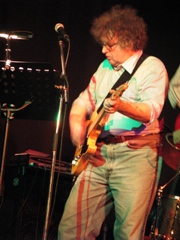 The American Poetry Review May/June 2017 issue includes a special supplement interview by Lance Rutkin with Paul Muldoon. Included in their discussion: Muldoon’s thoughts on “commissioned” work; how to approach art when writing poetry about it; playing with linguistics in poetry; structuring a volume of poetry; the place of poetics in contemporary Irish politics; his poetic relationship with Seamus Heaney; and the sonnet form in the current day. Read the full interview here.
The American Poetry Review May/June 2017 issue includes a special supplement interview by Lance Rutkin with Paul Muldoon. Included in their discussion: Muldoon’s thoughts on “commissioned” work; how to approach art when writing poetry about it; playing with linguistics in poetry; structuring a volume of poetry; the place of poetics in contemporary Irish politics; his poetic relationship with Seamus Heaney; and the sonnet form in the current day. Read the full interview here.
Spread the word!
WLT New Native Writing
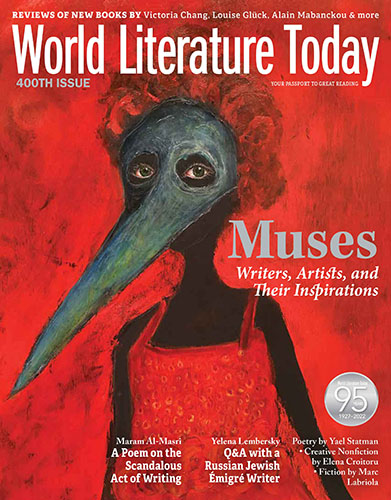 The May – August 2017 issue of World Literature Today features New Native Writing: From Wounded Knee to Standing Rock, guest edited by Jeanetta Calhoun Mish. The section includes “twenty-eight writers with tribal affiliations from throughout the continental US as well as Guåhån (Guam) and American Samoa.” In her introduction, Mish writes about the 1992 WLT feature “From this World: Contemporary American Indian Literature” in an issue “released just before Returning the Gift, a historic Native writers’ conference held on the University of Oklahoma’s campus, the home of World Literature Today.”
The May – August 2017 issue of World Literature Today features New Native Writing: From Wounded Knee to Standing Rock, guest edited by Jeanetta Calhoun Mish. The section includes “twenty-eight writers with tribal affiliations from throughout the continental US as well as Guåhån (Guam) and American Samoa.” In her introduction, Mish writes about the 1992 WLT feature “From this World: Contemporary American Indian Literature” in an issue “released just before Returning the Gift, a historic Native writers’ conference held on the University of Oklahoma’s campus, the home of World Literature Today.”
Mish used that 1992 date as the start point for the works she collected for this feature, “to avoid creating categories and to reaffirm the impact of Returning the Gift, I solicited submissions from United States Native writers whose first book was published after the 1992 festival. Despite the simple, temporal structure of this approach, I believe the aesthetics and thematics Native scholars and writers have identified are clearly present in the work.” A full list of contributors can be found here.
Twenty-five years later, Returning the Gift Literary Festival returns to Oklahoma University campus (October 8-11, 2017). For more information about the festival, visit here.
Spread the word!
2016 Jeffrey E. Smith Editor’s Prize Winners
Issue 40:1 of the Missouri Review features winners of the 26th Jeffrey E. Smith Editor’s Prize. Winning entries in each genre receive $500 and publication.
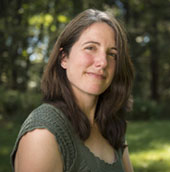 Fiction Winner
Fiction Winner
“Instructions to the Living from the Condition of the Dead” by Jason Brown of Eugene, OR
Poetry Winner
Karen Skolfield [pictured] of Amherst, MA
Nonfiction Winner
“Swarf” by Tyler Keevil of Abergavenny, UK
A full list of finalists and runners-up can be found here.
Spread the word!
Main Street Rag Needs Poetry
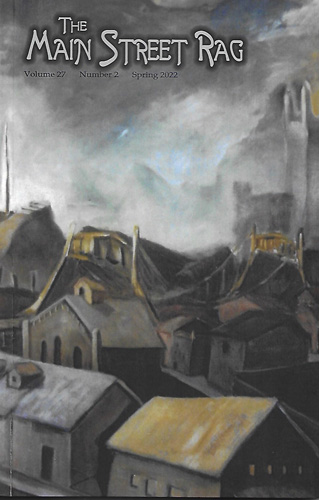 In his Spring 2017 Welcome Readers! section, Main Street Rag Publisher M. Scott Douglass offers readers a historical assessment of the publication’s genre content. Having originally started as a poetry journal, Douglass says it was from the advice of Dana Gioia and others that he started publishing fiction and then later book reviews. Now, he says, with the Spring 2017 issue, “for the first time ever – the balance has been tipped in the favor of prose.” He considers possible reasons for this, but the bottom line: “Main Street Rag needs poetry submissions. We need a lot of them. And we need them as soon as possible or the Summer issue may end up being a totally prose edition.”
In his Spring 2017 Welcome Readers! section, Main Street Rag Publisher M. Scott Douglass offers readers a historical assessment of the publication’s genre content. Having originally started as a poetry journal, Douglass says it was from the advice of Dana Gioia and others that he started publishing fiction and then later book reviews. Now, he says, with the Spring 2017 issue, “for the first time ever – the balance has been tipped in the favor of prose.” He considers possible reasons for this, but the bottom line: “Main Street Rag needs poetry submissions. We need a lot of them. And we need them as soon as possible or the Summer issue may end up being a totally prose edition.”
Whatever you can do to help, readers. The publication DOES accept simultaneous submissions, Douglass assures – though the website may not yet reflect this change in policy. Writers can expect a reasonable report time, and, according to Douglass, a review by “a tougher poetry editor than we’ve ever had before. . . but that only makes the magazine better.” MSR takes submissions via Submittable; there is a reading fee which is waived for subscribers.
